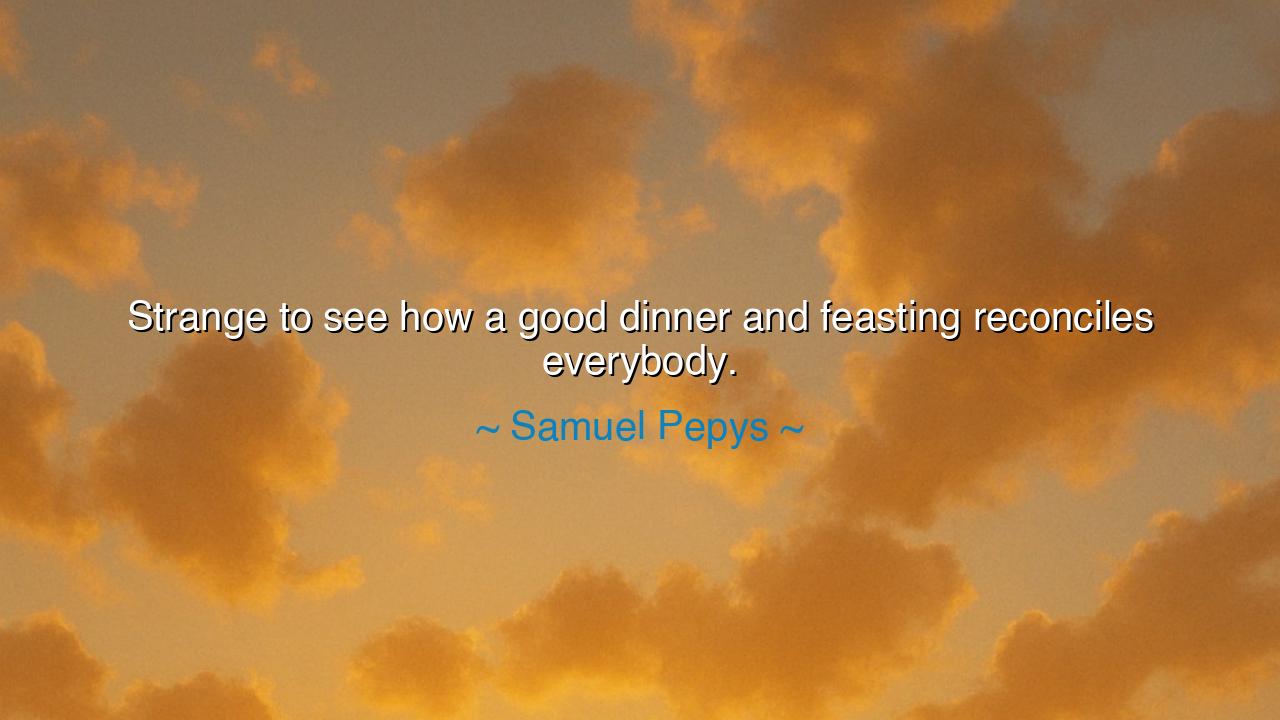
Strange to see how a good dinner and feasting reconciles






Samuel Pepys, that great diarist of the 17th century, left behind words that echo with simplicity and yet with deep human wisdom: “Strange to see how a good dinner and feasting reconciles everybody.” This utterance may appear light, a passing remark about food and companionship, yet hidden within it lies an eternal truth about the nature of humankind. Where debates, quarrels, and divisions may wound, the act of sharing a table has the power to soften the heart and reawaken the bonds of fellowship.
The ancients knew this truth well. From the symposiums of Greece, where philosophers debated over cups of wine, to the banquets of kings, where enemies were turned into allies through the breaking of bread, the table has always been a sacred altar of peace. Pepys, living amidst the turbulence of plague, fire, and political strife in London, observed how easily men, once seated to feast, could lay aside their quarrels. For when the senses are comforted and the hunger of the body is stilled, the soul becomes open once more to laughter, warmth, and reconciliation.
Consider the tale of King Henry IV of France, who once invited his divided court to a grand feast after bitter disputes threatened his throne. The hall was filled with nobles who had sworn against one another, yet over roasted meats and wine their hearts softened, laughter returned, and alliances were mended. A meal, simple though it may be, became the ground upon which peace was planted. Pepys’ words mirror this eternal pattern: feasting binds what anger has torn apart.
There is something sacred in the act of eating together. When hands reach for the same bread, when lips are quenched from the same pitcher, divisions appear smaller, and shared humanity shines brighter. The table does not ask who is noble and who is poor, who is in power and who is outcast; it demands only that all sit, partake, and be nourished. In this way, it is one of life’s great equalizers, softening pride and dissolving hostility.
But the lesson is not only for kings and courtiers. In our own lives, how many quarrels could be eased, how many cold silences warmed, if only we invited one another to the table? A family torn by dispute may find peace in the warmth of a shared meal; two friends estranged may find forgiveness over coffee and bread. The wisdom of Pepys is not distant—it calls upon each of us to heal divisions not through endless argument, but through the simple grace of fellowship.
Therefore, let all who hear these words take action. When strife rises in your household, invite those you love to dine with you. When a friend has grown distant, extend to them the gift of a shared meal. When a community is divided, gather its members around food, for the heart that eats together learns again to beat in harmony. This is not weakness but wisdom, for to mend relationships requires not only reason, but also the gentle touch of shared humanity.
The ancients would say: “Break bread, and you break enmity.” Pepys saw it with his own eyes in a turbulent age, and we see it still in ours. The banquet is more than food; it is a ritual of peace, a binding of souls. Let us not despise such simple remedies, for they are the mightiest. For truly, as Pepys declared, it is strange—yet wondrous—to see how a good dinner and feasting reconciles everybody.
Thus, children of tomorrow, remember: when walls rise high and words grow sharp, do not only argue or retreat. Instead, set the table, prepare the meal, invite your adversary—and let the power of feasting perform its ancient work of reconciliation. For in this act, humble yet divine, lies the healing of many wounds.






AAdministratorAdministrator
Welcome, honored guests. Please leave a comment, we will respond soon